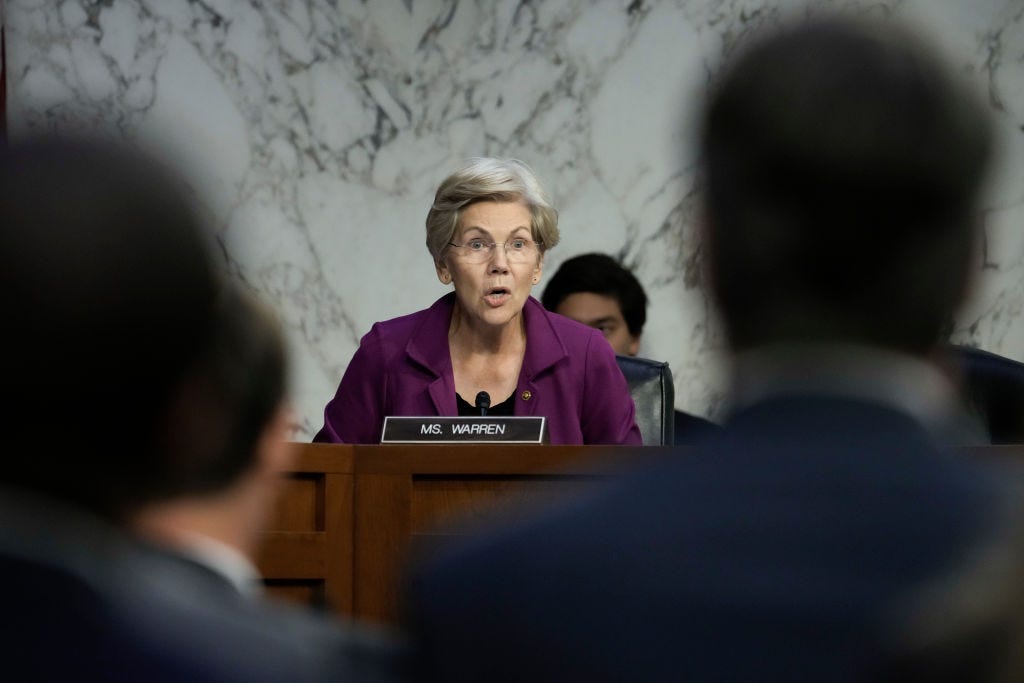
Drew Angerer/Getty Images
Millions of student-loan borrowers could be facing a financial strain that will hinder their abilities to buy a house or get a new job, Sen. Elizabeth Warren said.
Ahead of a Tuesday meeting with Linda McMahon, President Donald Trump’s education secretary, Warren published a blog post — first viewed by Business Insider — detailing her concerns with the Trump administration’s move to restart collections on defaulted borrowers’ student loans.
After Trump announced on May 5 that consequences for student-loan defaults would resume after a five-year pause — including garishment of wages and federal benefits — the New York Federal Reserve released a report that said 8.04% of borrowers moved into serious delinquency in the first quarter of 2025, putting them at greater risk of defaulting this summer.
Most federal student-loan borrowers enter default after falling behind on payments for more than 270 days.
Additionally, 2.2 million of the newly delinquent borrowers saw their credit scores drop over 100 points after negative credit reporting resumed in October 2024, the New York Fed said. Warren wrote in her blog post that a “damaged credit score is a financial scarlet letter that can follow consumers for years.”
“It can mean borrowers paying thousands more in interest rates on car loans, if they can get approved at all. It can mean being rejected for mortgages, forcing people into expensive rental markets where they build no equity. It can mean paying security deposits for utilities, cell phone plans, and apartments that those with good credit get for free,” she wrote. “Nearly half of all employers now run credit checks, meaning damaged credit can cost someone a job opportunity.”
Warren also said that Trump’s big spending bill, which the House recently passed, threatens to push “millions more over a financial cliff.” The version of the bill that the House passed, which now sits in the Senate, would condense all existing income-driven repayment plans into two plans with less generous terms that would leave borrowers paying off their debt over a longer period of time with a potentially higher monthly payment.
This comes amid a backlog of income-driven repayment application processing; recent data from the Department of Education showed that nearly 2 million borrowers still had pending applications. Former President Joe Biden’s SAVE plan, which would have allowed for cheaper monthly payments and a shorter timeline to loan forgiveness, is also blocked in court.
McMahon has previously said that restarting collections on defaulted loans would restore accountability to the student-loan system.
“Borrowing money and failing to pay it back isn’t a victimless offense,” McMahon wrote in an opinion piece. “Debt doesn’t go away; it gets transferred to others.”
Ellen Keast, a spokesperson for the Department of Education, confirmed to BI last week that while collections have resumed, the department is pausing Social Security garnishment.
“The Trump Administration is committed to protecting social security recipients who oftentimes rely on a fixed income,” Keast said. A separate noticed posted on the department’s debt resolution website said that the garnishments will resume “sometime this summer,” along with wage garnishment.
Preston Cooper, a senior fellow at the conservative think-tank American Enterprise Institute, told BI that while the collections restart was inevitable, its abrupt nature means that many borrowers probably aren’t aware that they’re in default, or of the options they have to get out of default.
Some borrowers previously told BI that after five years of relief, they’re not prepared for the consequences of defaulting.
“I don’t have any problem paying back what I borrowed, but I do have a problem with the lack of transparency and all of the false promises that I feel like the federal government has made to me over the years,” Holly Bechard, a 42-year-old borrower, said.
Are you in default, or concerned about defaulting, on your student loans? Share your story with this reporter at [email protected].
The post Millions of student-loan borrowers are getting a ‘financial scarlet letter’ that could risk their home purchases and job prospects, Elizabeth Warren says appeared first on Business Insider.




